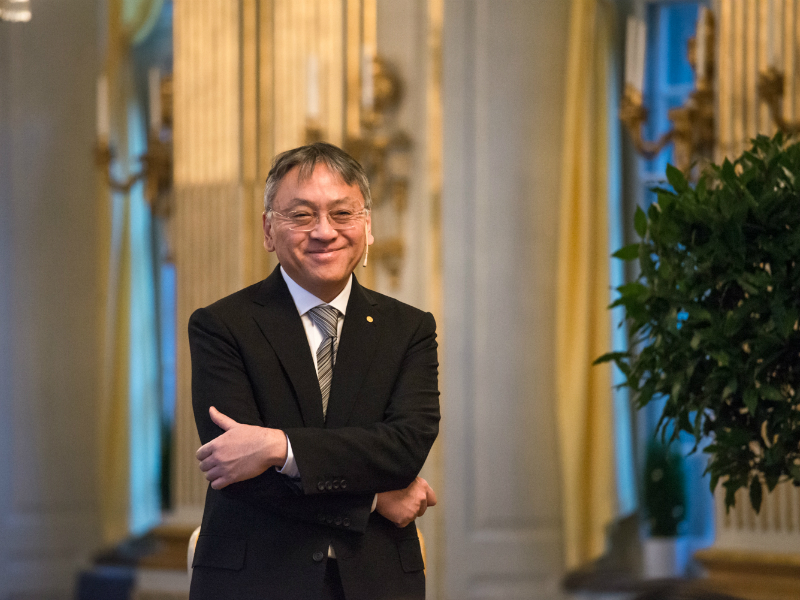In 2018, there will be no Nobel Prize in literature. This stems not from a lack of literary accomplishment, but from the fallout of a sexual-harassment scandal that included the resignation of the Nobel Committee’s permanent secretary and public face, Sara Danius.
To make up for the absence of a prize this year, two will be given in 2019. (There is precedent for this: two winners shared the prize in 1917, and Nelly Sachs and S.Y. Agnon shared it in 1966; from 1940 through ’43, no prize was given, as war caused it to go on hiatus).
Readers yearning for something with the Nobel stamp of approval can turn to the recently published acceptance lecture from last year’s winner, Kazuo Ishiguro, which is provocatively titled My Twentieth Century Evening and Other Small Breakthroughs: The Nobel Lecture (Alfred A. Knopf).
Ishiguro is best known for his widely read novels, including The Remains of the Day and Never Let Me Go, both of which were made into memorable films. He has been writing since the late 1970s, when his first books addressed the wartime and postwar atmosphere of Nagasaki, his birthplace.
Ishiguro offers a complex reading of his Japanese identity at the outset of My Twentieth Century Evening, characterizing his life by its divided attachments: he grew up and was educated as a Brit, living in the English countryside and in London. His memories of acculturation are positive: “I’m amazed by the openness and instinctive generosity with which our family was accepted…. The affection, respect and curiosity I retain to this day for that generation of Britons who came through the Second World War, and built a remarkable new welfare state in its aftermath, derive significantly from my personal experiences from those years.”
His early work presented a version of Japan, made of “memory, imagination and speculation.” His aim was to get “down on paper that world’s special colours, mores, etiquettes; its dignity, its shortcomings … before they faded forever from my mind.”
Ishiguro’s Nobel lecture follows two remarkable themes: the turning points in a writer’s development and the responsibility of a young writer to examine and represent his home country’s struggles with “forgetting and remembering.”
The account of a writer’s apprenticeship might seem most pressing to readers who are themselves writers, but Ishiguro’s approach to his writerly growth addresses the impact of creativity more broadly.
He conveys how an imaginative life grows in intimate, often constrained quarters; how certain authors – in Ishiguro’s case, Proust – offer useful models; and he highlights how a break with an inherited tradition allowed him to write his way into a “more international, outward-looking British literature, one that didn’t claim any centrality or automatic importance for Britain.”
One anecdote highlights his habitual attention to music, and to the way a singer’s voice changed his creative goals. Thinking the manuscript of what would become his best-known novel, The Remains of the Day, was complete, he took time out to listen to a Tom Waits album.
Ishiguro recounts how a particular song caught his attention. He focused on the “moment, midway through the song, when the singer tells us that his heart is breaking.” Waits, he says, sings with “cathartic magnificence,” a wealth of emotion that he recognized his own character should glimpse, yet had not, in the novel’s conclusion.
Ishiguro’s creative self-portrait is one of growth by careful and thoughtful labour. His portrait of political developments in the years of his literary success is darker. This theme is introduced by an account of a visit he made in 1999, at the invitation of a German poet, to the Auschwitz Youth Meeting Centre that stands halfway between the ruins of Auschwitz and Birkenau.
Before the ruins of the Auschwitz gas chambers, his host mused about the challenge of preserving the ruins “for the eyes of succeeding generations.”
This encounter heightened Ishiguro’s sense of his own generation’s responsibilities: “Did the burden of remembering fall to my own generation? We hadn’t experienced the war years, but we’d at least been brought up by parents whose lives had been indelibly shaped by them. Did I, now, as a public teller of stories, have a duty I’d hitherto been unaware of?”
Ishiguro’s fiction struggled from the start with themes of forgetting and remembering. But new questions and ways to address these themes presented unavoidable challenges: “Does a nation remember and forget in much the same way as an individual does? … What exactly are the memories of a nation? Where are they kept? How are they shaped and controlled? Are there times when forgetting is the only way to stop cycles of violence, or to stop a society disintegrating into chaos or war?”
These questions are in dramatic play today in Canada. In Victoria, B.C., the removal of a statue of Sir John A. Macdonald followed discussions of his responsibility for the residential school system. In Montreal, a major theatre artist’s revue of slave songs was cancelled when activists challenged the absence in it of local black performers.
READ: HOLOCAUST COMIC BOOK IS A WORTHY SUCCESSOR TO MAUS
Ishiguro’s queries, made in late 2017 in Stockholm before a hundred or so well-heeled invitees, provide a useful context in which to explore our own histories of remembering and forgetting.
Once read, the Nobel lecture is available online via the Nobel Committee’s video record of its delivery. Ishiguro is a modest presence at the dais, standing before what looks like gold-leaf panelling and beneath elaborate crystal chandeliers. His hair is short and grey at the sides; he wears a conservative dark jacket, white shirt and silver tie. In light of his comment on the impact of Tom Waits’s voice on his art, it’s worthwhile to judge the effect of Ishiguro’s mellow voice on his readers.
He sounds a pressing alarm regarding artistic and political responsibilities in the tone of your kindest uncle.
